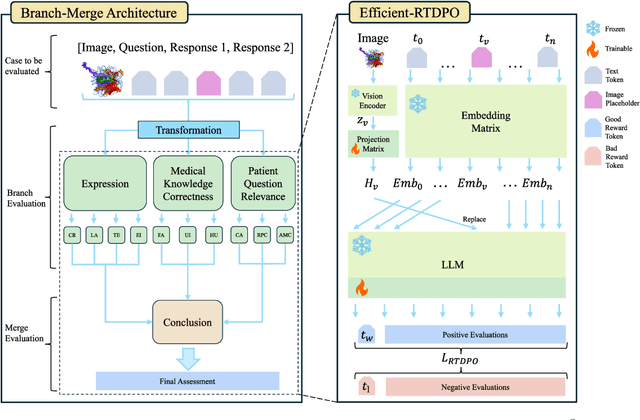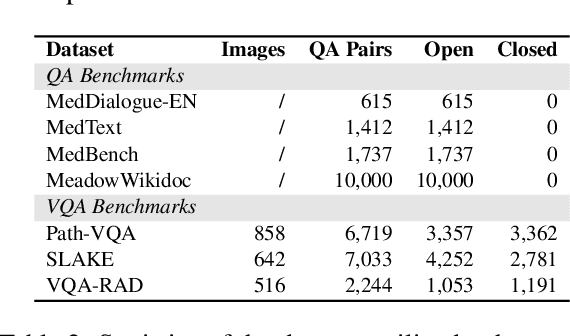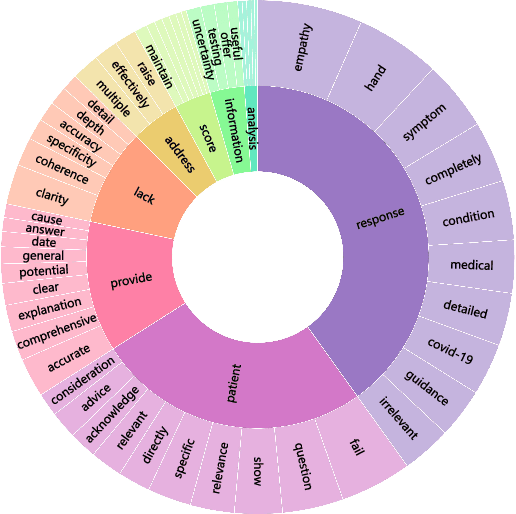Xiechi Zhang
AutoMedEval: Harnessing Language Models for Automatic Medical Capability Evaluation
May 17, 2025Abstract:With the proliferation of large language models (LLMs) in the medical domain, there is increasing demand for improved evaluation techniques to assess their capabilities. However, traditional metrics like F1 and ROUGE, which rely on token overlaps to measure quality, significantly overlook the importance of medical terminology. While human evaluation tends to be more reliable, it can be very costly and may as well suffer from inaccuracies due to limits in human expertise and motivation. Although there are some evaluation methods based on LLMs, their usability in the medical field is limited due to their proprietary nature or lack of expertise. To tackle these challenges, we present AutoMedEval, an open-sourced automatic evaluation model with 13B parameters specifically engineered to measure the question-answering proficiency of medical LLMs. The overarching objective of AutoMedEval is to assess the quality of responses produced by diverse models, aspiring to significantly reduce the dependence on human evaluation. Specifically, we propose a hierarchical training method involving curriculum instruction tuning and an iterative knowledge introspection mechanism, enabling AutoMedEval to acquire professional medical assessment capabilities with limited instructional data. Human evaluations indicate that AutoMedEval surpasses other baselines in terms of correlation with human judgments.
Hierarchical Divide-and-Conquer for Fine-Grained Alignment in LLM-Based Medical Evaluation
Jan 12, 2025Abstract:In the rapidly evolving landscape of large language models (LLMs) for medical applications, ensuring the reliability and accuracy of these models in clinical settings is paramount. Existing benchmarks often focus on fixed-format tasks like multiple-choice QA, which fail to capture the complexity of real-world clinical diagnostics. Moreover, traditional evaluation metrics and LLM-based evaluators struggle with misalignment, often providing oversimplified assessments that do not adequately reflect human judgment. To address these challenges, we introduce HDCEval, a Hierarchical Divide-and-Conquer Evaluation framework tailored for fine-grained alignment in medical evaluation. HDCEval is built on a set of fine-grained medical evaluation guidelines developed in collaboration with professional doctors, encompassing Patient Question Relevance, Medical Knowledge Correctness, and Expression. The framework decomposes complex evaluation tasks into specialized subtasks, each evaluated by expert models trained through Attribute-Driven Token Optimization (ADTO) on a meticulously curated preference dataset. This hierarchical approach ensures that each aspect of the evaluation is handled with expert precision, leading to a significant improvement in alignment with human evaluators.
ACE-$M^3$: Automatic Capability Evaluator for Multimodal Medical Models
Dec 16, 2024



Abstract:As multimodal large language models (MLLMs) gain prominence in the medical field, the need for precise evaluation methods to assess their effectiveness has become critical. While benchmarks provide a reliable means to evaluate the capabilities of MLLMs, traditional metrics like ROUGE and BLEU employed for open domain evaluation only focus on token overlap and may not align with human judgment. Although human evaluation is more reliable, it is labor-intensive, costly, and not scalable. LLM-based evaluation methods have proven promising, but to date, there is still an urgent need for open-source multimodal LLM-based evaluators in the medical field. To address this issue, we introduce ACE-$M^3$, an open-sourced \textbf{A}utomatic \textbf{C}apability \textbf{E}valuator for \textbf{M}ultimodal \textbf{M}edical \textbf{M}odels specifically designed to assess the question answering abilities of medical MLLMs. It first utilizes a branch-merge architecture to provide both detailed analysis and a concise final score based on standard medical evaluation criteria. Subsequently, a reward token-based direct preference optimization (RTDPO) strategy is incorporated to save training time without compromising performance of our model. Extensive experiments have demonstrated the effectiveness of our ACE-$M^3$ model\footnote{\url{https://huggingface.co/collections/AIUSRTMP/ace-m3-67593297ff391b93e3e5d068}} in evaluating the capabilities of medical MLLMs.
 Add to Chrome
Add to Chrome Add to Firefox
Add to Firefox Add to Edge
Add to Edge